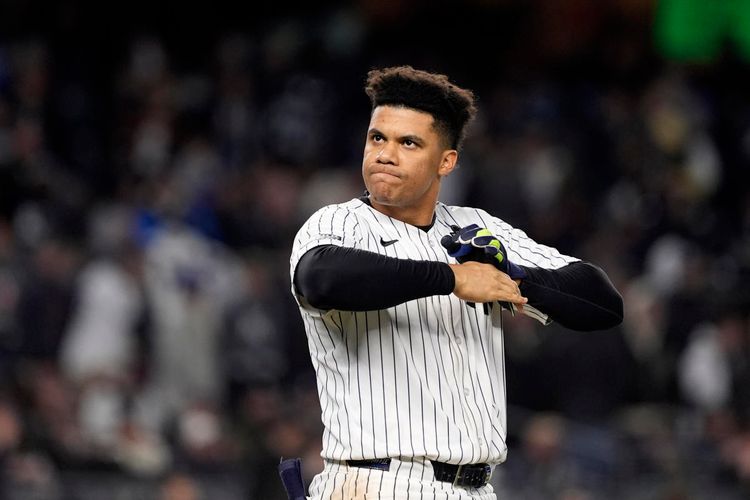For the Yankees, losing Juan Soto to the Mets is about more than ...

DALLAS — For 327 halcyon days, Juan Soto was a New York Yankee.
It was a glorious, swashbuckling tenure. One filled with swaggering acts of baseballing dominance — no-doubt homers and defiant bases on balls and gestures of love to hordes of adoring bleacher creatures. A perfect match, they said. Soto, a monumental player born to play for baseball’s most monumental outfit. In ALCS Game 5, with an at-bat for the ages and a swing for the books, Soto sent the Yankees to the World Series. It all felt like just the beginning.
Late Sunday night, that joyride came to a sudden, thudding and definitive end.
Soto is now a New York Met.
Mets owner Steve Cohen extended an eye-popping, paradigm-shifting, 15-year, $765 million contract to make that possible. It is not just the largest deal in MLB history; it’s the largest deal in sports history. Cohen, one of the planet’s 100 richest souls, was willing to reach heretofore unthinkable heights to bring Soto to Queens. He outbid the Yanks, plain and simple.
Yankees owner Hal Steinbrenner’s best offer, per ESPN, was 16 years, $760 million, around $4 million less per year than the final deal. That’s a strong offer, one that should keep understandably ravenous Yankees fans off Steinbrenner’s tail, but nobody is raising a “we tried” banner in the Bronx.
Can the Yankees craft a competitive team in the wake of Soto’s departure? Absolutely. The Bombers still employ Aaron Judge, the best hitter in the world, and Gerrit Cole, one of the best pitchers in the world. There are enough needle-moving free agents left available to reinforce that core. Adding, say, left-handed starter Max Fried, first baseman Christian Walker, right fielder Teoscar Hernández and a veteran reliever or two would help the Yankees stay a formidable force. Some, though likely not all, of the 750-odd million set aside for Soto will be reallocated elsewhere.
That said, it will be nearly impossible to make up for Soto’s offensive production. No single player provides that combination of power, on-base skill and sheer intimidation; that’s why he just got paid $765 million. The Yankees will attempt, as the Moneyball mantra goes, to replace him in the aggregate. And on a purely statistical level, they might be able to. When it comes to roster construction, there remain paths to salvation for Steinbrenner and general manager Brian Cashman.
But from a public relations slant, losing Soto is an unmitigated disaster.
For decades the Yankees have operated as a behemoth, an unimpeachable, untouchable financial juggernaut atop the baseball world. It’s a track record of economic superiority that stretches all the way back to Babe Ruth. When Hal’s father, George Steinbrenner, bought the club in 1973, in the dawning days of MLB’s free-agent era, that dollar-bill bullying only intensified. The Yankees have always spent the most money, both to keep their own players and to acquire new ones.
Now they aren’t even the top dogs in their own city.
Juan Soto is on the Mets because Cohen is a much, much richer man than Steinbrenner. Suddenly, the Mets, long a baseball punch line for their frugality under old ownership and their propensity for wonky controversy, are all grown up. They’re not just sitting at the adult table but commanding it with ungodly gobs of money. Cohen once spent $244 million on a pair of statues; Soto is pocket change for him.
Money, in sports as in life, matters only as far as what it allows or restricts one from doing. Giving Soto a king’s ransom won’t alter how Cohen lives (lavishly) or how his baseball team does business (assertively). Whether Soto is worth $765 million doesn’t really matter, not in the big picture and not to Cohen. He’s good for it. If Soto doesn’t live up to the contract — whatever, it’s all just cash.
Steinbrenner, whose fortune comes directly from the success of the Yankees, simply cannot operate in that hemisphere. And if he had outbid Cohen’s offer, surely Cohen would have re-upped the ante.
That dynamic signifies a significant changing of the guard, both in the Big Apple and across MLB. The Mets and Dodgers are in a financial league of their own. The Yankees are a level below. Such a statement would’ve sounded preposterous 15 years ago, when the Mets were run by the stingy Wilpon family and the Dodgers were bankrupt by a clueless owner.
But times have most certainly changed, and the Yankees, now Soto-less, must find a way to adapt to this new, unforgiving reality.












































![3 Best Methods for iOS Pokemon GO Spoofing [No PC]](/_largethumb/uploads/news/115/11539/8/11539847-3-best-methods-for-ios-pokemon-go-spoofing-no-pc.jpg.webp)
![3 Best Methods for iOS Pokemon GO Spoofing [No PC]](/_newsthumb/uploads/news/115/11539/8/11539847-3-best-methods-for-ios-pokemon-go-spoofing-no-pc.jpg.webp)





